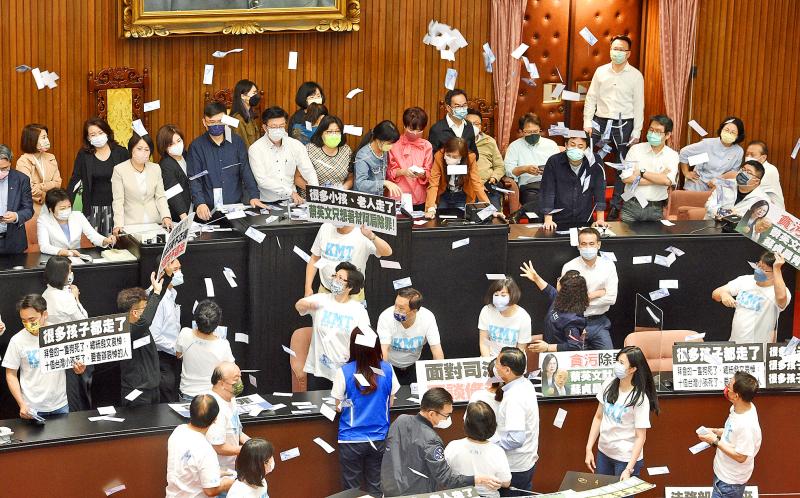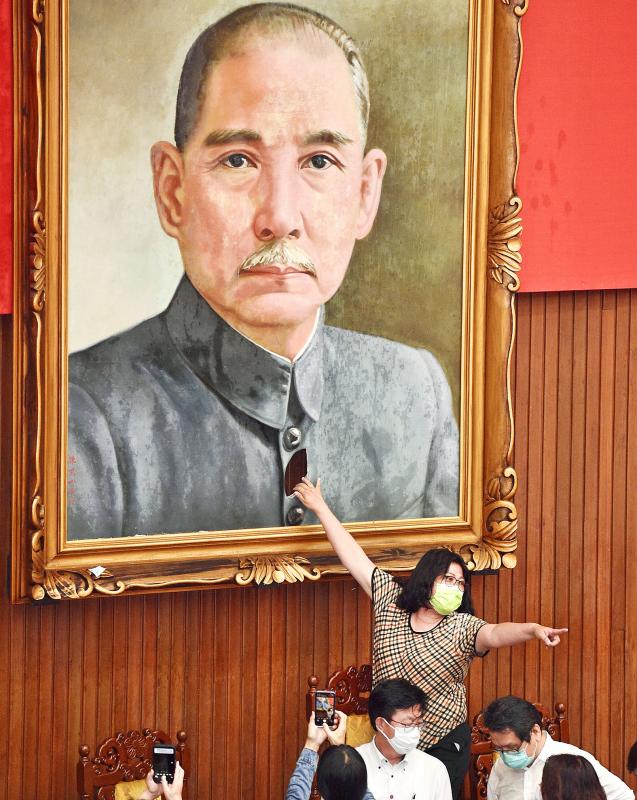The Legislative Yuan yesterday passed an amendment to exempt presidents from punishment over improper use of special funds prior to 2007, as scuffles over the proposal resulted in a tear in the portrait of Sun Yat-sen (孫中山) behind the speaker’s podium.
The change regards Article 99-1 of the Accounting Act (會計法), which absolves officials of liability for improper use of special allowance funds before Dec. 31, 2006.
“Special allowance funds” are those used by officials, apart from the president, for discretionary public relations purposes, such as rewards and gifts. They are categorically separate from the “special state affairs fund,” which is allocated by the president.

Photo: Peter Lo, Taipei Times
Usage of the funds has been a target for corruption probes into numerous officials, including former president Chen Shui-bian (陳水扁).
Defendants say that the purview of the funds is poorly defined, leaving them open to accusations of corruption.
Article 99-1, proposed by the Chinese Nationalist Party (KMT) and promulgated in 2011, was largely viewed as excluding the president’s special state affairs fund to avoid exonerating Chen.

Photo: Peter Lo, Taipei Times
The two fund types were separate in the 1940s and 1950s, but combined in the 1960s, the Democratic Progressive Party (DPP) said.
DPP Legislator Tsai Yi-yu (蔡易餘) and others therefore proposed an amendment to add the special state affairs fund to Article 99-1.
The KMT disagreed that the funds are functionally the same, accusing the DPP of trying to change the law to exonerate Chen.

Photo: Peter Lo, Taipei Times
KMT lawmakers in the morning occupied the speaker’s podium to protest the bill. The podium was later retaken by DPP members.
When Deputy Speaker Tsai Chi-chang (蔡其昌) entered at 10:05am to begin proceedings, KMT legislators threw fake money at DPP members standing at the podium, while shouting: “Fake COVID-19 prevention, real corruption, all to exonerate Chen.”
They also threw water cups that legislators blocked with signboards, one of which hit the large portrait of Sun, tearing a hole in the canvas.
The KMT caucus was unable to block the majority DPP from voting the proposal through.
With the amendment’s passage, no legal basis appears to remain for the life sentences handed to Chen and his wife, Wu Shu-jen (吳淑珍), or the 20-year and 16-year sentences given to former Presidential Office deputy secretary-general Ma Yung-cheng (馬永成) and his successor, Lin Teh-hsun (林德訓), respectively.
The Supreme Court yesterday said it would handle the cases according to the law.
DPP caucus whip Ker Chien-ming (柯建銘) said the two fund types are inseparable from their history.
In 1949, only Chiang Kai-shek (蔣介石) had access to special funds, but in 1951, access was extended to ministers and heads of the five branches of government, Ker said.
During the 1950s, special funds were granted to more officials, totaling up to 7,000, he added.
No matter what the funds are called, on the ledger they serve the same function and are a part of transitional justice, Ker said.
The New Power Party (NPP) caucus yesterday said Premier Su Tseng-chang (蘇貞昌) should use his constitutional authority to veto the amendment and return it to the legislature for a second review.
“While we believe that stakeholders involved in the controversies of state-secret affairs expenses in 2006 are entitled to seek justice through legal procedures, we strongly oppose the proposed DPP amendment because of the case involving former president Chen,” the NPP said.
While saying that the KMT set a bad legal precedent in 2013 by amending the same article to exonerate former KMT legislator Yen Ching-piao (顏清標) from allegations of misappropriating public funds, the NPP said the DPP yesterday again set a bad precedent by forcibly passing the bill at the legislature.
Additional reporting by Shelley Shan, Yang Kuo-wen and Hsieh Chun-lin

SECURITY: As China is ‘reshaping’ Hong Kong’s population, Taiwan must raise the eligibility threshold for applications from Hong Kongers, Chiu Chui-cheng said When Hong Kong and Macau citizens apply for residency in Taiwan, it would be under a new category that includes a “national security observation period,” Mainland Affairs Council (MAC) Minister Chiu Chui-cheng (邱垂正) said yesterday. President William Lai (賴清德) on March 13 announced 17 strategies to counter China’s aggression toward Taiwan, including incorporating national security considerations into the review process for residency applications from Hong Kong and Macau citizens. The situation in Hong Kong is constantly changing, Chiu said to media yesterday on the sidelines of the Taipei Technology Run hosted by the Taipei Neihu Technology Park Development Association. With

CARROT AND STICK: While unrelenting in its military threats, China attracted nearly 40,000 Taiwanese to over 400 business events last year Nearly 40,000 Taiwanese last year joined industry events in China, such as conferences and trade fairs, supported by the Chinese government, a study showed yesterday, as Beijing ramps up a charm offensive toward Taipei alongside military pressure. China has long taken a carrot-and-stick approach to Taiwan, threatening it with the prospect of military action while reaching out to those it believes are amenable to Beijing’s point of view. Taiwanese security officials are wary of what they see as Beijing’s influence campaigns to sway public opinion after Taipei and Beijing gradually resumed travel links halted by the COVID-19 pandemic, but the scale of

A US Marine Corps regiment equipped with Naval Strike Missiles (NSM) is set to participate in the upcoming Balikatan 25 exercise in the Luzon Strait, marking the system’s first-ever deployment in the Philippines. US and Philippine officials have separately confirmed that the Navy Marine Expeditionary Ship Interdiction System (NMESIS) — the mobile launch platform for the Naval Strike Missile — would take part in the joint exercise. The missiles are being deployed to “a strategic first island chain chokepoint” in the waters between Taiwan proper and the Philippines, US-based Naval News reported. “The Luzon Strait and Bashi Channel represent a critical access

Pope Francis is be laid to rest on Saturday after lying in state for three days in St Peter’s Basilica, where the faithful are expected to flock to pay their respects to history’s first Latin American pontiff. The cardinals met yesterday in the Vatican’s synod hall to chart the next steps before a conclave begins to choose Francis’ successor, as condolences poured in from around the world. According to current norms, the conclave must begin between May 5 and 10. The cardinals set the funeral for Saturday at 10am in St Peter’s Square, to be celebrated by the dean of the College